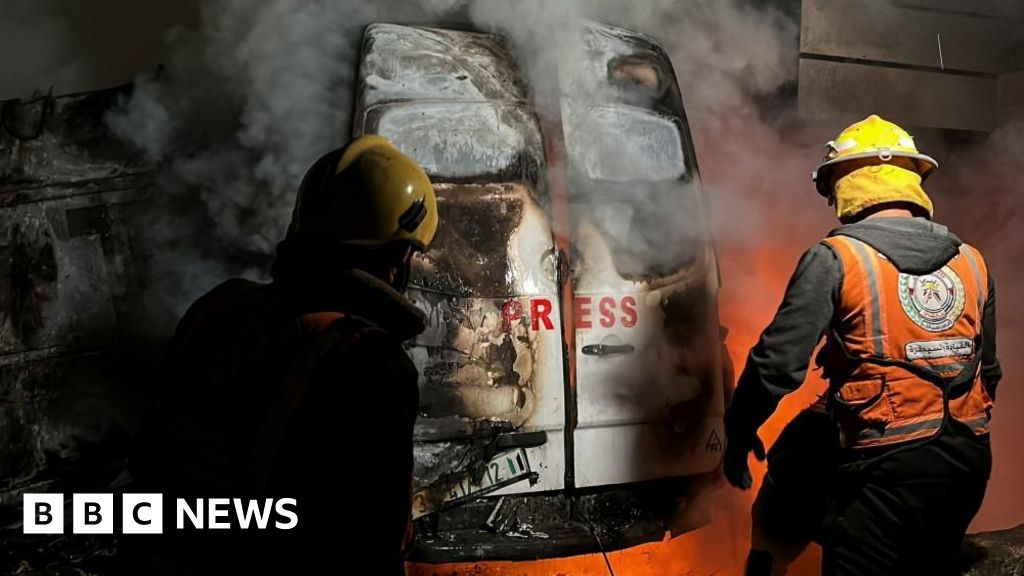
Israeli police bomb squad inspect the site after a missile fired from Lebanon hit the area in Petah Tikva, outskirts of Tel Aviv, Israel, Sunday Nov. 24, 2024. Oded Balilty/AP/AP hide caption
toggle caption
Oded Balilty/AP/AP
BEIRUT — An Israeli strike on a Lebanese army center on Sunday killed one soldier and wounded 18 others, the Lebanese military said. The Hezbollah militant group meanwhile fired barrages of rockets into northern and central Israel, wounding at least five people.
Israeli strikes have killed over 40 Lebanese troops since the start of the war between Israel and Hezbollah, even as Lebanon's military has largely kept to the sidelines.
There was no immediate comment from the Israeli military, which has said previous strikes on Lebanese troops were accidental and that they are not a target of its campaign against Hezbollah.
Lebanon's caretaker prime minister, Najib Mikati, condemned it as an assault on U.S.-led cease-fire efforts, calling it a "direct, bloody message rejecting all efforts and ongoing contacts" to end the war.
"(Israel is) again writing in Lebanese blood a brazen rejection of the solution that is being discussed," a statement from his office read.
The strike occurred in southwestern Lebanon on the coastal road between Tyre and Naqoura, where there has been heavy fighting between Israel and Hezbollah.
Hezbollah fires rockets after strikes on Beirut
Hezbollah began firing rockets, missiles and drones into Israel after Hamas' Oct. 7, 2023, attack out of the Gaza Strip ignited the war there. Hezbollah has portrayed the attacks as an act of solidarity with the Palestinians and Hamas. Iran supports both armed groups.
Israel has launched retaliatory airstrikes since the rocket fire began, and in September the low-level conflict erupted into all-out war, as Israel launched waves of airstrikes across large parts of Lebanon and killed Hezbollah's top leader, Hassan Nasrallah, and several of his top commanders.
Hezbollah fired barrages of rockets into northern and central Israel on Sunday, some of which were intercepted.
Israel's Magen David Adom rescue service said it was treating two people in the central city of Petah Tikva, a 23-year-old man who was lightly wounded by a blast and a 70-year-old woman suffering from smoke inhalation from a car that caught fire. The first responders said they treated three other people in northern Israel, including a 60-year-old man in serious condition.
It was unclear whether the injuries and damage were caused by the rockets or interceptors.
Israeli airstrikes early Saturday pounded central Beirut, killing at least 20 people and wounding 66, according to Lebanon's Health Ministry.

Rescue workers search for victims at the site of an Israeli airstrike that hit central Beirut, Lebanon, Saturday, Nov. 23, 2024. Hussein Malla/AP/AP hide caption
toggle caption
Hussein Malla/AP/AP
Israeli attacks have killed more than 3,500 people in Lebanon, according to Lebanon's Health Ministry. The fighting has displaced about 1.2 million people, or a quarter of Lebanon's population.
On the Israeli side, about 90 soldiers and nearly 50 civilians have been killed by bombardments in northern Israel and in battle following Israel's ground invasion in early October. Around 60,000 Israelis have been displaced from the country's north.
EU envoy calls for pressure on both sides to reach a truce
The Biden administration has spent months trying to broker a cease-fire, and U.S. envoy Amos Hochstein was back in the region last week.
The European Union's top diplomat called for more pressure on both Israel and Hezbollah to reach a deal, saying one was "pending with a final agreement from the Israeli government."
Josep Borrell spoke Sunday after meeting with Mikati and Lebanese Parliament Speaker Nabih Berri, a Hezbollah ally who has been mediating with the group.
Borrell said the EU is ready to allocate 200 million euros ($208m) to assist the Lebanese military, which would deploy additional forces to the south.
The emerging agreement would pave the way for the withdrawal of Hezbollah militants and Israeli troops from southern Lebanon below the Litani River in accordance with the U.N. Security Council resolution that ended the 2006 war. Lebanese troops would patrol the area, with the presence of U.N. peacekeepers.
Lebanon's army reflects the religious diversity of the country and is respected as a national institution, but it does not have the military capability to impose its will on Hezbollah or resist Israel's invasion.

 1 month ago
9
1 month ago
9










 English (US) ·
English (US) ·